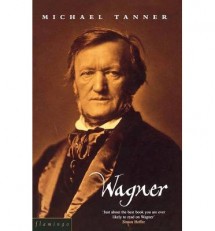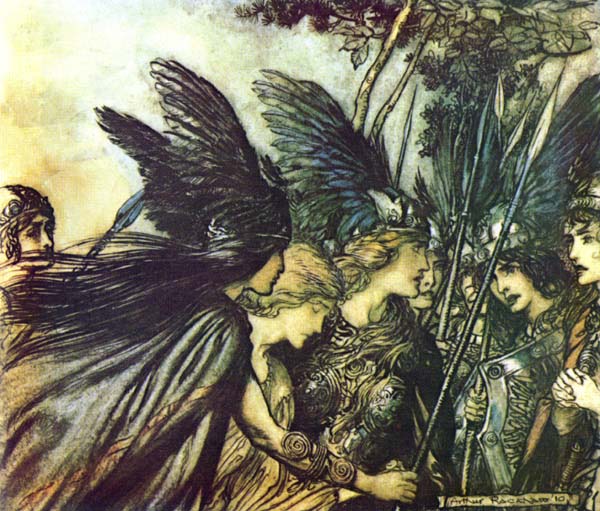Wagner by Michael Tanner

Science has proved that books on Wagner’s life and works would more than fill the Grand Canyon. It is therefore necessary to be discriminating (in a good way) as to what reading matter on the Maestro you choose to buy, beg, borrow or steal. Michael Tanner is a perceptive opera critic of good standing, an unapologetic Wagnerite, and his little book on the subject of Wagner’s work is a lucid and concise presentation of his views on Wagner’s raison d’être and the dimensions of his achievement. Despite tending to present difficult concepts in convoluted, laborious language (the hallmark of the professional philosopher, which Tanner is), the work covers all of the operas in a pithy manner, with stimulating, suggestive and at times, provocative reflections on the composer’s motivation, objectives and outcomes. The text is difficult, but struggling through it brings the reward of new understanding (and it is much less of a slog than, say, sitting through Meistersinger).
Wagner was determined to teach (if necessary, through force) the World that most recherché of skills: To Listen. He went about that heroic task with typical Teutonic thoroughness, creating and re-shaping myths, mining history’s great sagas and belief structures (you could say, paraphrasing Gough Whitlam, that Wagner was a fellow-traveller with all the great religions). To sugar his pot, and spice his plots, he created some of the greatest music ever heard, wonderful and deep musical whirls of gist, mood and atmosphere. It is no exaggeration to assert that if you delve into the chasms of Wagner librettos, read his pungent, rousing and often repulsive tracts on art, research his mythological sources, yet you achieve nothing without experiencing the synthesis of this valuable baggage with the music. Wagner’s best language is not German, but music. It is not possible, or even sensible, to separate the music from the drama or from the image (this is Gesamtkunstwerk).
One must look elsewhere for a detailed biography – there is a useful chronology appended (obviously not as accurate nor comprehensive as TVC‘s Wagner Timeline) – and Tanner cites details from the life only as context for his analysis of the music-dramas, but there are ample alternate resources to consult for biographical detail (or if you prefer biographical fiction, Mein Leben) and Tanner lists several such in a useful select bibliography. Nor will the reader be enveloped in a pall of leitmotif deconstruction – one can go to, for example, Robert Donington for a Jungian interpretation of these. Tanner shies away from a probe of the musical aspects of the operas, tacitly following Martin Mull’s superb dictum that “writing about music is like dancing about architecture.”
Instead Tanner begins, mildly enough, by posing (but not immediately answering) the question of why Wagner attracts violent controversy. He intimates that it has something to do with both a uniquely visceral feeling and intellectual response evoked in those exposed to the works, and in that context, he quotes a significant passage from Opera and Drama:
“Nothing should remain for the synthesising intellect to do in the face of a performance of a dramatic work of art; everything presented in it must be so conclusive that our feeling about it is brought to rest; for in the bringing to rest of this feeling, after its highest arousal in sympathy with it, lies that very peace which leads us to the instinctive understanding of life. In drama we must become knowers through feeling.”
I can hear A.J. Ayer harrumphing in the ether. But Wagner’s opinion seems vaguely aligned with The Varnished Culture‘s statement that art is a process of extracting emotion through technique.
Before discussing the works themselves, the author has some fun demolishing the straw man of Wagner’s various real and supposed personal defects…the proto-Nazi, the Jew baiter, the philanderer, the prodigal, the opportunist, the demagogue. These charges are trumped-up, exaggerated or facile, or all of the above, and in any case irrelevant unless they infect the art, and possibly even then. Tanner views these ‘prejudices and banalities’ as, once again, a reflection that reaction to/against Wagner seems to be sui generis and he concludes:
“All told, I’m inclined to feel that Wagner’s capacity for making writers on him, many of them securely established in academic jobs, reveal their priggish and disapproving lack of imagination is his most vexing feature.”
Tanner reviews the operas, in chronological order of construction, and a fascinating journey it is. He draws on the undoubted veneration of the heroic in his dramas (and comedies) but though this is part of his romanticism, it is hardly new (vide Greek drama). He notices that Wagnerian heroes lay a uniquely radical challenge to the life to be lived, which is almost impossible to meet in conventional terms. Virtually all of his protagonists have a complex past, helping to paint themselves further into a corner.
The early works contain superior drama (for their time) and occasionally sublime music. Lohengrin, the bridge to Wagner’s rich later phase, overwhelms with its consistently beautiful music but lacks that je ne sais quoi as drama. Here’s Tanner (p. 89) on the existential crisis this caused in the composer:
“There are several reasons why Lohengrin was succeeded by five years during which Wagner wrote no more music, other than a few jottings for the Ring. But it is hard not to conclude that the basic one was that he realised that his musical genius and his dramatic concerns would, if he was not careful, grow apart, and he would become merely another operatic composer, even if one of extraordinary impressiveness.”
If Lohengrin or Flying Dutchman or even Tannhäuser were all that Wagner wrote, he would still be in or near the top rank of opera composes. But miraculously, he went on to create 6 of the greatest 10 operas of all time – the Ring, Tristan und Isolde, Die Meistersinger von Nürnberg, and Parsifal. Tanner reviews these and their underlying philosophy in depth, with wit and discernment, but we won’t tease out his various theses – you should buy the book. But his conclusion seems to be that Wagner’s central dramatic figures seek some sort of non-doctrinal absolution – based on a terribly all-encompassing, all-consuming renunciation – of the world as we know it, of gold, of prosaic love, and of the very self.
Leave a comment...
While your email address is required to post a comment, it will NOT be published.



2 Comments